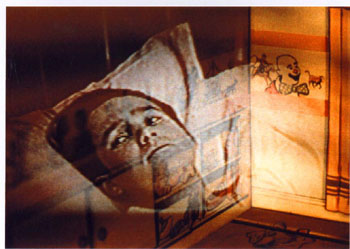|
Janie Geiser
is
an internationally recognized filmmaker and theater
artist whose work is known for its sense of mystery, its detailed evocation
of self-contained worlds, and its strength of design. Her work has been
shown nationally and internationally, and she has been recognized with
numerous awards, including an Obie Award, a Guggenheim Fellowship, a
Creative Capital grant and a 2002 Rockefeller Fellowship in film. Geiser
has also made a significant contribution to the field of contemporary
puppet theater through her innovative original theater works. She began
making films in 1990, first as an element of her performance work, and
then as a separate form. Since
that time, Geiser’s films have been shown at the Whitney Museum
of American Art, the Guggenheim Museum, and the Museum of Modern Art,
where her film The Red Book was featured in the 1996 New Directors /
New Films Festival. Her short films have previously premiered four times
(1996,
1998, 2000, 2002) at the New York Film Festival. Other major showings
include the 2002 Toronto International Film Festival, the Rotterdam
International Film Festival, three San Francisco Film Festivals, ALIVE
TV, REEL NY, and other PBS venues. Her film The Secret Story was
chosen by Film Comment’s Gavin Smith as one of the Best Short
Films of 1996, and The Fourth Watch was on Film Comment’s list
of the Best Short Films of 2000.
Geiser,
a former New Yorker, lives now in Los Angeles where she is the Director
of the Cotsen Center for Puppetry and the Arts at CalArts.
note:
tom Recchion, the composer of both of these films, is also an LA artist
and performs with a number of bands here including Extended Organ.
------------------------films-----------------------
Lost
Motion
A film by Janie Geiser
Music:
Tom Recchion
16mm, color, 11 minutes
(1999)
Lost
Motion uses small cast metal figures, toy trains, decayed skyscrapers,
and other found objects to follow a man’s search for a mysterious
woman. From an illegible note found on a dollhouse bed, through impossible
landscapes, the man waits for her train which never arrives. His wanderings
lead him to the other side of the tracks, a forgotten landscape of derelict
erector- set buildings populated by
lost souls. Dream merges with nightmare in this post-industrial land
of vivid night.
Fred Camper writes in the Chicago Reader (May 25, 2000):
“Lost
Motion is the sumptuously told tale of a failed search...In her most
visually lush film to date, Geiser superimposes images and drapes her
scenes in moving shadow patterns. She depicts the train’s arrival
by superimposing images of dolls exiting model trains over the searching
man’s figure... Ultimately the film’s fragmentary constructions
become more than modernist denials of illusion and assertions of materiality.:
essential to the film’s tone, Geiser’s obviously illusory
images evoke strong feelings as the mundane drama of a failed meeting
becomes
intertwined with an essay on the way our lushest dreams fail by virtue
of their very extravagance.”
Recent
Screenings:
2001
American Film Insitiute
2001 Images Festival (Toronto)
2000 Walker Art Center
2000 Chicago Filmmakers
2000 New York Film Festival
2000 Pacific Film Archives
2001 Museum of Modern Art
2001 San Francisco Museum of Modern Art
-------------------------------------
The Fourth Watch
A Film by Janie Geiser
(Direction, design, camera, editing by Janie Geiser)
16mm,
color. (2000)
Music: Tom Recchion
The
ancient Greeks divided the night into four sections; the last section
before morning was called the fourth watch. In these hours before dawn,
an endless succession of rooms is inhabited by silent film
figures occupying flickering space in a midcentury house made of printed
tin. Their presence is at once inevitable and uncanny. A boy turns his
head in dread, a woman’s eyes look askance, a sleepwalker
reaches into a cabinet which dissolves with her touch, and hands write
letters behind disappearing windows. The rooms reveal themselves and
fill with impossible, shadowed light. It is not clear who is watching
and who is trespassing in this nocturnal drama of lost souls.
Mark
McElhatten, co- curator of the 2000 New York Film Festival’s Views
From the Avant-Garde, where The Fourth Watch premiered, writes:
“A
small masterpiece of the uncanny brought about through beautifully controlled
use of superimposition and scale and a cross breeding of “incompatible”
species of texture and (cathode - solar) light.
Glacial blue poltergeist -somnabulists, melodramatic stars and damaged
children from silent films - emerge at night into a tin dollhouse opening
up invisible envelopes of space, comingling with hypnoticic
chiaroscura cast by trembling sunlight.”
Kristin
M. Jones, in her review “NYFF: Views from the Avant-Garde”
in the November-December 2000 issue of Film Comment, writes:
“Of
the three Janie Geiser works screened, perhaps most haunting was The
Fourth Watch, in which images of people in black-and-white movies rephotographed
from a video monitor are superimposed on shots of a
dollhouse interior. Bluish, spectral figures float by as sunlight mingles
with flickering shadows on brightly colored tin. A beautiful somnambulist
vanishing into TV bar rolls suggests a poetic metaphor for the current
state of avant-garde cinema, when the medium’s past,
future, and even its own death are being transformed into material for
provocative new films.”
Selected
Screenings:
2000
New York Film Festival
2000 Pacific Film Archives
2001 Rotterdam International Film Festival
2001 Images Festival (Toronto)
2001 San Francisco Film Festival
2001 Imageforum, Tokyo
2001 Museum of Modern Art, NY
2001 San Francisco Museum of Modern Art
|
Title: Watch
Show: Have You Ever... / Secret
Films of Girls





.Click
Above to View
|

